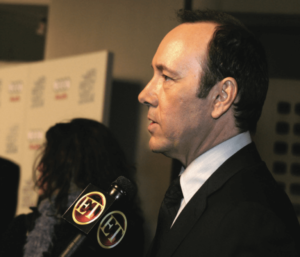As co-founder and chief executive officer of the predictive analytics firm Spotted, Janet Comenos knows a lot about famous actors, artists, athletes and celebrity advertising. Her Boston startup matches companies with celebrities for endorsements and advertising.
But lately Comenos has been learning a lot about insurance and talking about it with the enthusiasm of a celebrity at her own premiere. She is excited about her new insurance subsidiary, SpottedRisk and its first production, a remake of “Disgrace Insurance” that she says is nothing like the original.
“My only regret in running this business is that I did not discover insurance earlier,” she exclaimed at the outset of an interview with Insurance Journal.

The reality is that celebrities — such as Bill Cosby, Felicity Huffman, Kevin Spacey, Roseann Barr, Tiger Woods or others in the news for the wrong reasons — can pose a risk to companies that do business with them. About a year ago, Comenos began hearing about this exposure from more of her clients. “I started noticing that our clients were becoming increasingly concerned about their risk exposure that they were taking on by dedicating such a significant portion of their marketing budget to one individual celebrity or a small handful,” she told Insurance Journal.
The disgraceful events can be damaging not only to reputations but also to the finances of the studios and brands. They can lose business due to the public backlash but even more damaging, they may need to pull out of contracts and put on hold or sometimes entirely scrap costly productions.
Comenos believes this concern is unlikely to fade given the growing popularity of social media and the rise of the #MeToo movement.
Lloyd’s Legacy Product
The Spotted executive was Googling risky celebrity behavior when she came across what she thought could be a solution: a Lloyd’s of London product called disgrace insurance that has been around for several decades. She and her team determined that the product as it was being sold would not be adequate for today but that the disgrace insurance concept was ripe for reinvention. Working with brokers including national wholesaler AmWINS and carriers writing at Lloyd’s including Markel and Talbot, Spotted studied the original product closely to better understand what needed to change.
First, previous underwriters had few guidelines to assess the risk of the talent and their propensity to be involved in a future disgrace event. As a result, they would place low limits on the policies, typically from $250,000 to $500,000.
“It was almost like a throw-in product that had a high deductible,” claims Comenos, who said these limits made the product unattractive to large brands or studios that might be paying from $25 million to $100 million a person or a production.
The legacy product also had exclusions that reduced the value of the coverage. Underwriters rejected cases involving celebrities with any reported misbehavior in their past, as well as bad behavior that did not surface until after the policy went into effect.
William Dixon, a senior vice president at AmWINS, said the prior approach to underwriting was also too invasive. “Studios felt that it put them at odds with their talent, asking types of questions that they typically wouldn’t have to ask but for this type of coverage,” he said.
Finally, the legacy product relied on an ambiguous and subjective trigger for claims. “It said a disgrace was any behavior that puts the named individual into disrepute. So something you may deem disgraceful, I may not, and vice versa,” Comenos explained.
Reinvented Product
Spotted and its partners weighed these issues and their knowledge of analytics in remaking disgrace insurance. Although it carries the name disgrace insurance, Spotted’s Lloyd’s product is quite different from the original. “We systematically improved every part of the product,” Comenos said, boasting of building “very robust underwriting guidelines” that convinced eight Lloyd’s markets to put up limits of up to $10 million per policy.
In its version, Spotted has eliminated all behavioral exclusions. Instead it uses its database of more than 26,000 famous people along with its predictive models to assess the risk that individual celebrities pose and price the risk for carriers.
Spotted covers just about “every imaginable type of talent” including actors, musicians, athletes, TV hosts, comedians, models, directors, producers, writers, influencers, chefs, artists and others.
Spotted also simplified the process for retail agents accessing the product through a wholesale broker. “All we need is the named individual and then a little bit of detail around the size and scope of the production or endorsement deal and the length of it. That’s it,” said Comenos. “Then we handle all the underwriting, deliver a rate to our Lloyd’s consortium, and then the policy is bound.”
According to Dixon, Spotted’s use of its proprietary database of “hundreds of data points” on each celebrity addresses the invasiveness problem while also simplifying the process. “That is the magic, that the ease of submission has just been amplified 1,000 times,” he said.
If something bad does happen, Spotted, with what could be its most important invention, offers a unique way to objectively assess how bad the disgrace is and how much a claim is worth. The startup has developed the Public Outcry Index that scores the public’s recall and perceived severity of a disgraceful behavior. The index is based on a survey with 26 questions that are asked of different groups of people over a period to understand if they can recall the event and how severe they think it is. The index, which was developed in partnership with the research firm Kantar, determines how serious the incident is and how much will be paid out.
“There has not been an objective measurement in the past. We are the first,” the Spotted executive said.
The insured may choose limits up to $10 million even if it only paying the celebrity $2 million. “A lot of the damages are actually immeasurable,” says Comenos. “The damage to the brand could be far more than what they pay the celebrity. It’s reputational damage that we’re helping compensate the client for.”
While Spotted’s policy lets insureds recoup losses associated with disgraceful behavior, it also provides post-incident analysis and crisis management assistance to mitigate the damage.
After a disgrace is made public, the client can receive Spotted’s public outcry analytics to help decide what to do, whether the company should fire the celebrity, issue an apology, or even go so far as to shelve a production if only temporarily.
AmWINS thinks Spotted’s approach is groundbreaking. “The fact that they have their own proprietary analytics and that they use a parametric trigger that is objective and is based on the public outcry, the shock value of it, is of great interest to us,” Dixon said.
Dixon believes this reinvented product will be popular but that there remains an educational challenge to “deliver the information that will differentiate this product from previous ones and make it of great interest.”
First Product
Spotted’s first disgrace insurance product is being targeted to companies that hire famous people, including film studios, film and TV financiers, brand advertisers, and sports teams and leagues. The product just launched this month. Comenos said there has been interest from Hollywood financiers and lenders as well as from studios, production companies and brands.
Even though Spotted has just begun to market the celebrity product, its already at work on a second product focused on executives. The public outcry index will be calculated differently for executives whose exploits are typically less well known than those of celebrities. Comenos said research has shown that executive misbehavior can have a short-term and long-term effect on the perception of a company.
AmWINS’ Dixon said he thinks the executive product might be a complement to directors and officers liability.
James Drinkwater, president of the North Carolina-based wholesaler AmWINS, has even higher hopes. “We are eager to support Spotted as we believe that this way of looking at risk will only evolve to other areas of the market that have the same fundamental issues – an innocent third party now has the ability to protect themselves from the bad behavior and the poor judgement of an associate or employee. This is much more than a Me Too product,” he said.
Was this article valuable?
Here are more articles you may enjoy.


 Zurich Insurance and Beazley Agree to $10.9B Cash Acquisition
Zurich Insurance and Beazley Agree to $10.9B Cash Acquisition  Marsh Awarded Injunction Against Former Employees Now With Howden US
Marsh Awarded Injunction Against Former Employees Now With Howden US  Cuts to Funding Mean Risks Will Pivot in Human Services Market
Cuts to Funding Mean Risks Will Pivot in Human Services Market  Georgia Insurance Law Is About to Get an Upgrade With Multiple Changes
Georgia Insurance Law Is About to Get an Upgrade With Multiple Changes 


